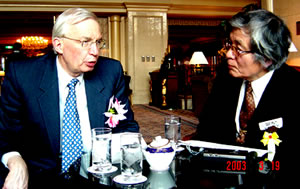|
|
Vol.
25 No. 5
September-October 2003
Chemical
Education International - Material,
Life, and Environment
Chemical
Education International is a online newsletter published
by IUPAC's Committee on Chemistry Education (CCE). Updated
regularly, the newsletter is intended for chemistry teachers,
professors, and those interested in chemical education.
The
newsletter covers:
-
reports on activities of CCE and its members, such as projects
-
news and reports of events held or supported by IUPAC and
related organizations, such as ICCE, CHEMRAWN, etc.
-
news and reports on chemical education in member countries
of international interest, which are written or communicated
by a CCE member
-
general articles on chemical education written or recommended
by a CCE member as meeting international interest of readers,
such as "Interview with Nobel Laureate," facts and figures,
opinions, and essays
Recent
CEI Articles
An
Interview with Nobel Laureate Jean-Marie Lehn
 |
| Prof.
J. M. Lehn (left) being interviewed by Prof. Y. Takeuchi. |
Y.
Takeuchi and M. M. Ito
Chemistry
Education International, Vol. 4, AN-1, (2003)
For
the benefit of those who aspire to a career in chemistry,
each issue of CEI contains a short interview with a Nobel
Laureate in chemistry. The intended readership of these interviews
are senior high school students who are at a point in their
life where they must make decisions about their future careers,
or first year university students in science and technology
who must begin to specialize in a chosen field of study. This
interview with Prof J. M. Lehn, conducted by Prof. Y. Takeuchi
and Prof. M. M. Ito, was carried out at the Rihga Royal Hotel
in Tokyo on 19 March 2003.
www.iupac.org/publications/cei/vol4/0401x0an1.html
Chemistry
is (Almost) Everywhere and in Everything
Arnon
Shani
Chemistry
Education International, Vol. 4, AN-2 (2003)
Students
in high schools seem to lack some of the basic information
that enables them to decide what to study in their last two
to three years, in particular when dealing with chemistry.
Moreover, when they consider further studies at a university,
they do not understand the differences between related subjects.
They also lack information regarding future employment possibilities
and the marketplace.
For
many years the author met with students and discussed chemistry
as a profession. In this article the author summarizes these
talks in a question-and-answer format. The article considers
the following questions:
- What
are the subjects studied at college that are related to
chemistry?
- What
are the main topics in chemistry taught at the university
level?
- What
are the major research fields in chemistry?
- What
are the differences between chemistry and closely related
subjects, such as chemical engineering, material engineering,
pharmacological studies, medicine, and biomedical engineering?
-
What is the role of chemistry in other subjects?
-
What types of occupations are there for chemists after college,
and what level of study is recommended for better employment?
www.iupac.org/publications/cei/vol4/0401x0an2.html
Page
last modified 3 September 2003.
Copyright © 2002-2003 International Union of Pure and
Applied Chemistry.
Questions regarding the website, please contact [email protected]
|